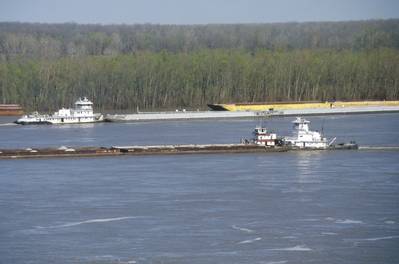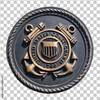Professional captains and pilots in all sectors of the maritime industry confront daunting challenges and hazards every day on every trip. From piloting oceangoing ships into congested harbors and safely docking them, to navigating ferries, tourist vessels and water taxis through harbors and rivers teaming with other commercial vessels and recreational craft and everything in between, U.S Coast Guard licensed deck officers have one of the most difficult, pressure-packed jobs in any industry.
Arguably, the pilots and captains who face the most challenging conditions in their daily duties are the hardworking officers aboard vessels navigating the nation’s rivers and their tributaries in the towboat industry. Bridges, dams and locks constantly changing water levels and shoaling and limited space in which to handle all of these shifting challenges while pushing a flotilla of barges are the rule, not the exception. Long periods away from home, constant time pressures and deadlines, all are under the watchful eyes of river-based Coast Guard commands make work in America’s inland rivers one of the most difficult career choices in the maritime … or any … industry.
Perhaps not surprisingly, when things go sideways, it seldom involves a minor incident. The following case study demonstrates how a seemingly routine passing arrangement between two towboat pilots became a nerve-wracking license-threatening mid-river collision – in an instant.
A Perilous Passing
The license-insured river pilot was traveling northbound on the Mississippi River at around 4 knots pushing 15 barges, seven of which were empty. When approaching one of the many railroad bridges spanning the river, he received radio contact from the pilot of a southbound tow who wanted to make arrangements for a passing to take place near the bridge. The northbound vessel approached the bridge on the portside descending bank with the intent of proceeding through the left descending span. Unfortunately, the river had other plans.
As he closed in on the bridge and the oncoming southbound tow, the swollen river’s current slowed his vessel’s speed to barely 1.5 knots and slowly began to affect control of the tow. Despite taking immediate and appropriate corrective action, the current’s strength prevailed, forcing his towboat and barges into the bridge piers causing the tow to break-up and scatter haphazardly across the river. The pilot’s corrective action, while unable to allow him to avoid alliding with the bridge piers, did prevent a collision with the southbound tow … an event which would have presented a higher probability of injury to the crews of both vessels, oil product discharge into the river and, most likely, a lengthy shutdown of the busy waterway.
The Coast Guard, both companies and bridge authority were all contacted and as the barges were slowly recovered and secured, the pilot of the northbound vessel was sent for drug testing before meeting with investigators from the regional Coast Guard command. Prudently, in the interim, he reported the incident promptly to his license insurance company and was assigned his own maritime attorney who, via cellular telephone prepped him for his initial Coast Guard verbal interview, assisted him in drafting his maritime casualty report (2692) and accompanied him to his formal Coast Guard interview.
Several nerve-wracking interviews and attorney conferences later, the Coast Guard investigators finally decided against pursuing negligence charges against the pilot, concluding that, given the circumstances, he had acted responsibly and did the best he could to prevent a bad situation from becoming even worse; in other words, a collision with the Southbound vessel and its barges. The only hitch: it took two years from the date of the incident for the captain to receive notification that no further action would be pursued against his license. This was perhaps the most agonizingly long 24 months in that professional mariner’s long and admirable career.
The legal fees incurred in the defense of this towboat pilot’s license totaled $4,500 as maritime attorney worked long and hard to get authorities to finally render a decision to bring him peace of mind that his Coast Guard license was not at risk. He was also very relieved that all his legal expenses were fully paid by his license insurance company.
While the pilot passed the incident site dozens of times since losing out to the power of the mighty Mississippi’s unpredictable currents without incident, there is also little doubt that the memory of that bridge allision and the two years of legal proceedings and long-awaited exoneration will never be forgotten. Nor will the knowledge that protecting one’s ticket before taking last line will always be a smart move, as well.
The Author
Randy O’Neill is Senior Vice President with Lancer Insurance Company.
(As published in the April 2017 edition of
Marine News)














